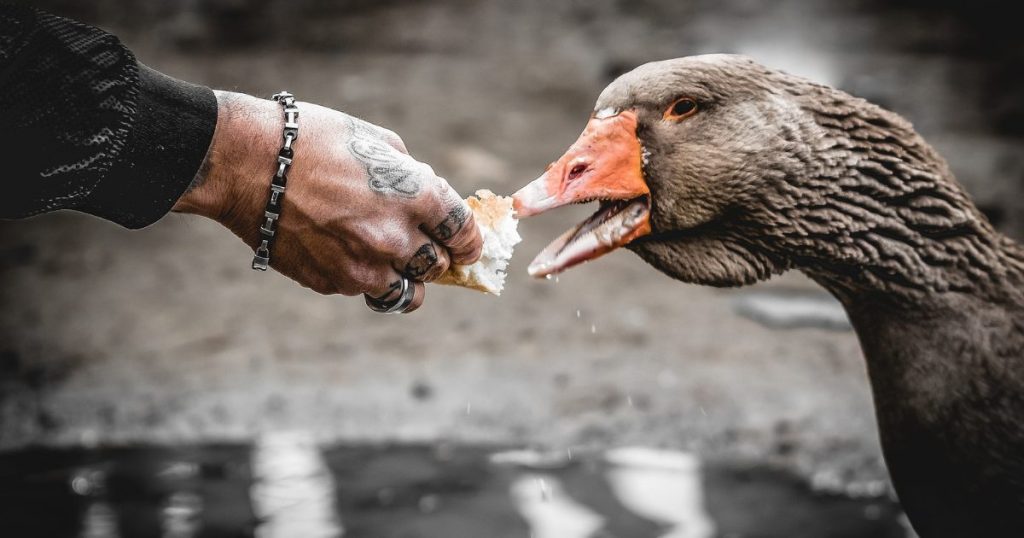Feeding bird spread to birds is something that a lot of us do or probably have done at one point or another in our life. It may seem harmless, but what will a little bit of bread do?

It may be surprising to learn that it’s harmful to birds. Bread is junk food. Even parks that have waterfowl often have signs up asking people to please not feed the bird’s bread, but that goes unnoticed sometimes.
Bread and Nutrition:
While you may think you are giving them an easy meal, you only provide them with empty calories. Bread and other bread products aren’t very nutritious. A lot of the nutritional content is lost due to the heavy processing, and bread nowadays contains salt, sugar, and preservatives. None of these things are good for humans, let alone birds or other animals.
Those foods only help to take their hunger away for a while by filling them up, but they do not provide them with the nutrition they require to be healthy, such as protein for muscles and feathers or healthy fats for energy.
What’s more, is that while they are full of bread?
They feel no need to forage for their natural, nutritious food, which is not good.
Angel Wing Syndrome and its fatality:
One fatal condition known as angel wing is thought to be directly related to birds fed unhealthy food, and guess what?

Birds tend to end up with angel wings if fed with bread.
Birds like swans and ducks live around areas with people, such as parks where bread is very common. People feed these birds with bread, and these poor birds often die, especially if they are adults. Among adult birds, this condition cannot be reversed. They can’t fly away from predators or migrate for winter. Thus they starve or freeze to death.
In young birds, however, it can be reversed by feeding them nutritional
diet, usually by a licensed rehabilitator.
Other illnesses caused by bread:
Also, birds like swans and Ducks fed with large amounts of bread and other unhealthy food can get obese, malnourished, and aggressive toward one another; developing chicks don’t get the nutrients needed for growth, causing them to become aggressive and develop diabetes and hypertension.

Birds that eat a lot of bread end up defecating more frequently, and the more bird poop around, the more chances of disease being spread double
which is not good.
Bread thrown in water and molds:
Another problem with bread is that it has the potential to grow mold pretty quickly, and mold is extremely toxic to birds. In addition, bread thrown into the water for ducks can rot if not eaten, thus polluting water and creating surface algae that cause illness in birds.
Can a small amount of bread have the same effect?
As mentioned, large quantities are harmful, so what if we give them a little? While that may be true, very small amounts may not harm them. You should consider this also, if you are feeding Birds a little bit of bread and ten other people are, then it’s no longer a small amount. It all adds up, and also, how do we determine what a little bit is? What you consider a small amount may not be the same to another person.
Besides all of this, though, no matter how small of an amount, it still provides no nutritional value, so it’s best to skip the bread
altogether and offer them better sources of food for our garden Birds such as Jays, chickadees, and others offer them the old tried and true things like suet black oil or safflower seeds and unsalted peanuts whole or shelled.

For the waterfowl at the park, bring food like pellets and seeds. Both are
inexpensive and will provide nutrition. You can even try some cracked corn bird seed, finely chopped lettuce, and small vegetable trimmings,

enough for their mouths.
Final Advice:
It’s best not to feed the ducks or swans at your local park. Being fed by humans can cause them to lose their natural fear of people, instead, bring a camera and watch them from afar, you never know what you will witness them do, and it’s pretty rewarding when you get that nice picture or cool video.
Or else make sure you are feeding Birds proper food, do research for your local area to ensure that the food you feed the birds is needed and, therefore, beneficial, different birds in different locations have different needs. We don’t know any better now. With this knowledge, you can offer our wonderful Feathered Friends the best feeding experience by doing.
Also, know more about the vast range of foods we want to avoid if we have birds,
Click the link to learn more.